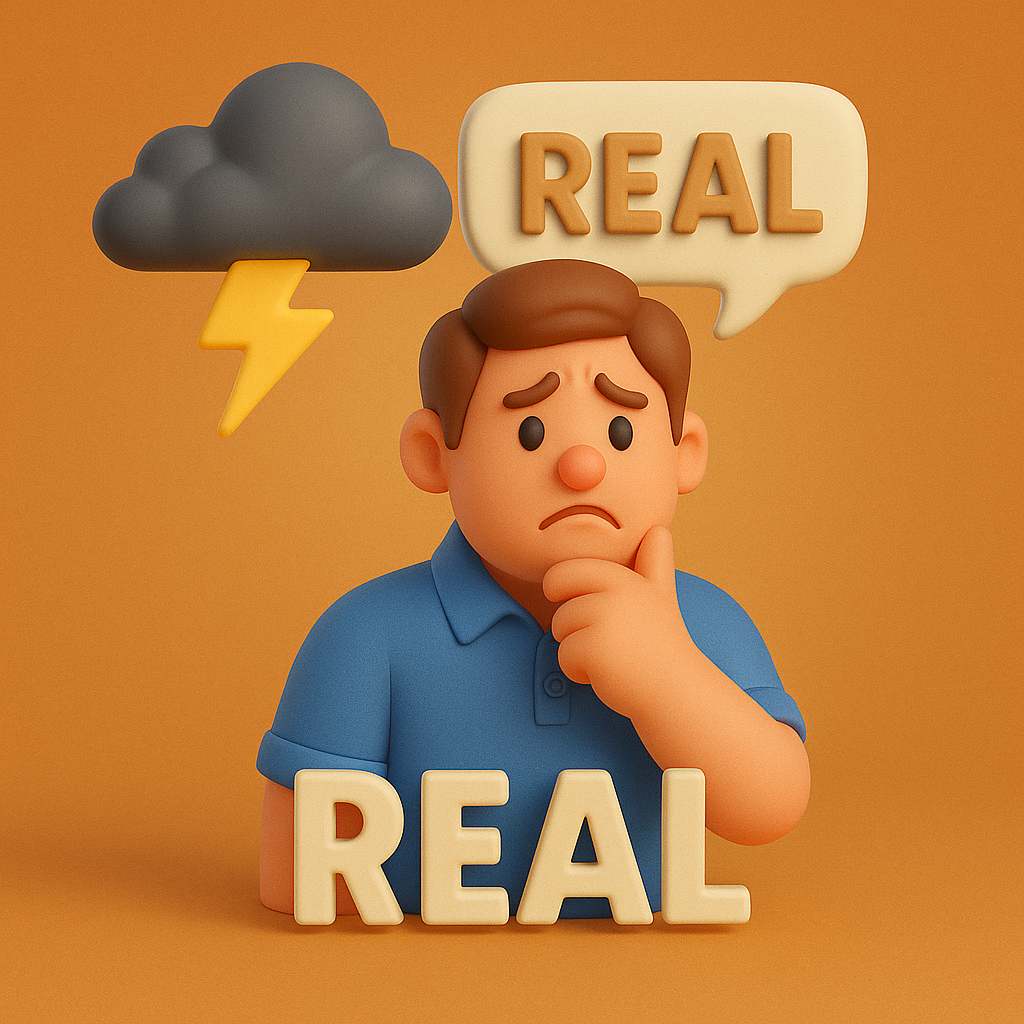Real
Definition
The term "real" refers to something that exists as a fact or reality, as opposed to being imaginary, artificial, or hypothetical. It can also describe authenticity, genuineness, or practical application.
Parts of Speech
- Adjective
- Noun
- Adverb (informal)
Pronunciation
American English
- IPA Pronunciation: /ˈriːəl/, /ˈrɪəl/, /ˈreɪəl/
- Respelling: REE-uhl, RIH-uhl, RAY-uhl
British English
- IPA Pronunciation: /ˈriːəl/, /ˈrɪəl/
- Respelling: REE-uhl, RIH-uhl
Etymology
The word "real" originates from the Latin "realis," meaning "actual" or "relating to things," derived from "res" (thing). It entered Old French as "real" and Middle English in the late 14th century, initially to denote "having an objective existence."
Derivatives
- Reality (noun)
- Realism (noun)
- Realist (noun/adjective)
- Realistic (adjective)
- Unreal (adjective)
Synonyms
- Genuine
- Actual
- Authentic
Antonyms
- Fake
- Imaginary
- Unreal
Usage
The term "real" is commonly used to contrast authenticity or existence with fakeness or imagination. For example, "This diamond is real, not synthetic," or "The danger was very real."
Related Terms
- Authenticity: The quality of being genuine or true.
- Reality: The state of things as they actually exist.
- Existence: The fact or state of living or having objective reality.
Detailed Definitions
Adjective
- Existing or occurring as a fact, not imaginary or artificial:
- Example: "The threat of a storm is real."
- Genuine or authentic, not counterfeit or imitation:
- Example: "This is a real leather bag."
- Practical or substantial rather than theoretical:
- Example: "He gained real experience during the internship."
Noun
- A thing that is real or exists as a fact:
- Example: "The real is often stranger than fiction."
Adverb (informal)
- Very or extremely (used colloquially):
- Example: "The movie was real good."
real



🇨🇳 Mandarin
- 真实 (zhēnshí) - genuine or truly exists
- IPA Pronunciation: /ʈʂən˥ʂʐ̩˥/
- English Respelling: zhen-shi
- 里亚尔 (lǐ yà ěr) - a denomination of currency
- IPA Pronunciation: /li˨˩˦ ja˥˩ ɚ˨˩˦/
- English Respelling: li ya er
🇮🇳 Hindi
- असली (asli) - genuine or truly exists
- IPA Pronunciation: /əs.liː/
- English Respelling: as-lee
- रियल (riyal) - a denomination of currency
- IPA Pronunciation: /riː.jaːl/
- English Respelling: ree-yal
🇪🇸 Spanish
- Real - genuine or truly exists
- IPA Pronunciation: /reˈal/
- English Respelling: re-al
- Real - a denomination of currency
- IPA Pronunciation: /reˈal/
- English Respelling: re-al
🇫🇷 French
- Réel - genuine or truly exists
- IPA Pronunciation: /ʁe.ɛl/
- English Respelling: re-el
- Réal - a denomination of currency
- IPA Pronunciation: /ʁe.al/
- English Respelling: re-al
🇸🇦 Modern Standard Arabic
- حقيقي (haqiqi) - genuine or truly exists
- IPA Pronunciation: /ħaːˈqiːqiː/
- English Respelling: ha-qi-qi
- ريال (riyal) - a denomination of currency
- IPA Pronunciation: /riːˈjaːl/
- English Respelling: ree-yal
🇧🇩 Bengali
- বাস্তব (bastab) - genuine or truly exists
- IPA Pronunciation: /bast̪ab/
- English Respelling: bas-tab
- রিয়েল (riyēl) - a denomination of currency
- IPA Pronunciation: /ri.ɛl/
- English Respelling: ri-el
🇷🇺 Russian
- Реальный (Real'nyy) - genuine or truly exists
- IPA Pronunciation: /rʲɪˈalʲnɨj/
- English Respelling: re-al-nyi
- Реал (Real) - a denomination of currency
- IPA Pronunciation: /rʲɪˈal/
- English Respelling: re-al
🇵🇹 Portuguese
- Real - genuine or truly exists
- IPA Pronunciation: /ʁeˈaw/
- English Respelling: re-au
- Real - a denomination of currency
- IPA Pronunciation: /ʁeˈaw/
- English Respelling: re-au
🇮🇩 Indonesian
- Nyata - genuine or truly exists
- IPA Pronunciation: /ɲaˈta/
- English Respelling: nya-ta
- Real - a denomination of currency
- IPA Pronunciation: /rɛˈal/
- English Respelling: re-al
🇩🇪 German
- Echt - genuine or truly exists
- IPA Pronunciation: /ɛçt/
- English Respelling: eckt
- Real - a denomination of currency
- IPA Pronunciation: /reˈaːl/
- English Respelling: re-ahl
🇯🇵 Japanese
- 真実 (shinjitsu) - genuine or truly exists
- IPA Pronunciation: /ɕiɲd͡ʑit͡sɨᵝ/
- English Respelling: shin-ji-tsu
- リアル (riaru) - a denomination of currency
- IPA Pronunciation: /ɾiaɾɯ̟ᵝ/
- English Respelling: ri-a-ru
🇻🇳 Vietnamese
- Thật - genuine or truly exists
- IPA Pronunciation: /tʰat̚˧˥/
- English Respelling: that
- Real - a denomination of currency
- IPA Pronunciation: /riˈaːl/
- English Respelling: re-ahl
🇰🇷 Korean
- 실제 (silje) - genuine or truly exists
- IPA Pronunciation: /ɕil̚t͈ɕe̞/
- English Respelling: shil-je
- 리얼 (rieol) - a denomination of currency
- IPA Pronunciation: /ɾi.e̞.o̞l/
- English Respelling: ri-eol
🇹🇷 Turkish
- Gerçek - genuine or truly exists
- IPA Pronunciation: /ɟeɾˈt͡ʃek/
- English Respelling: yer-chek
- Real - a denomination of currency
- IPA Pronunciation: /reˈal/
- English Respelling: re-al
🇵🇰 Urdu
- اصلی (asli) - genuine or truly exists
- IPA Pronunciation: /əs.liː/
- English Respelling: as-lee
- ریال (riyal) - a denomination of currency
- IPA Pronunciation: /riː.jaːl/
- English Respelling: ree-yal





